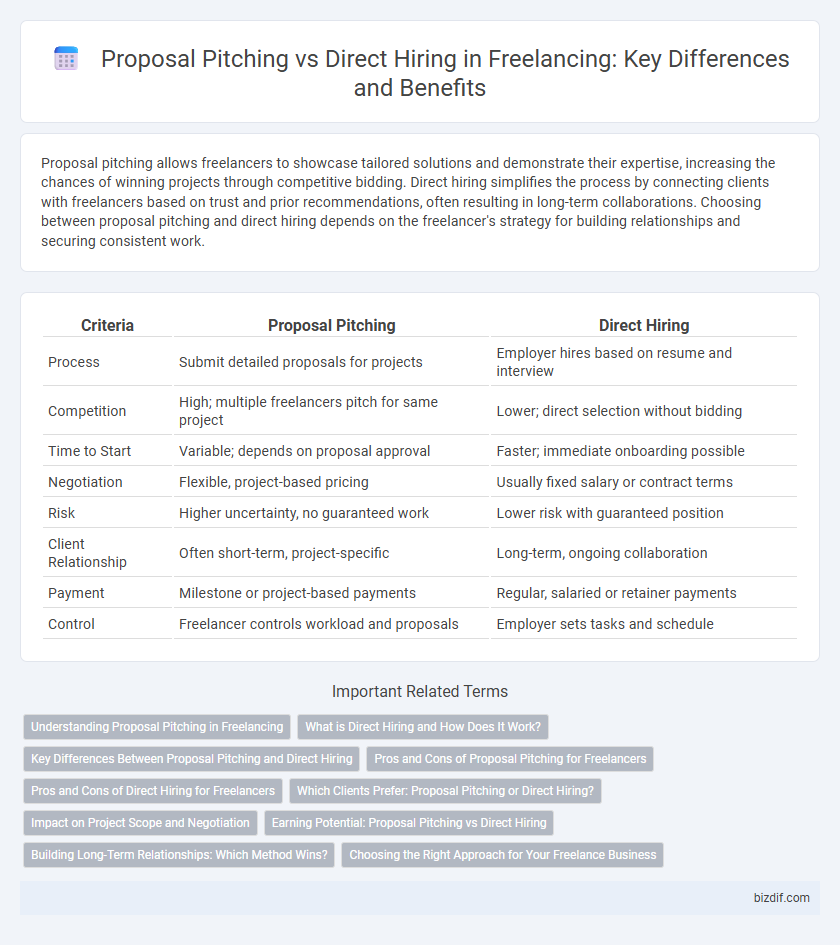Proposal pitching allows freelancers to showcase tailored solutions and demonstrate their expertise, increasing the chances of winning projects through competitive bidding. Direct hiring simplifies the process by connecting clients with freelancers based on trust and prior recommendations, often resulting in long-term collaborations. Choosing between proposal pitching and direct hiring depends on the freelancer's strategy for building relationships and securing consistent work.
Table of Comparison
| Criteria | Proposal Pitching | Direct Hiring |
|---|---|---|
| Process | Submit detailed proposals for projects | Employer hires based on resume and interview |
| Competition | High; multiple freelancers pitch for same project | Lower; direct selection without bidding |
| Time to Start | Variable; depends on proposal approval | Faster; immediate onboarding possible |
| Negotiation | Flexible, project-based pricing | Usually fixed salary or contract terms |
| Risk | Higher uncertainty, no guaranteed work | Lower risk with guaranteed position |
| Client Relationship | Often short-term, project-specific | Long-term, ongoing collaboration |
| Payment | Milestone or project-based payments | Regular, salaried or retainer payments |
| Control | Freelancer controls workload and proposals | Employer sets tasks and schedule |
Understanding Proposal Pitching in Freelancing
Proposal pitching in freelancing requires crafting a tailored message that clearly addresses the client's specific needs, demonstrating expertise and value to stand out among competitors. Unlike direct hiring, which often involves a straightforward selection process based on known qualifications, proposal pitching demands strategic communication, keyword optimization, and a persuasive approach to secure projects. Mastering proposal pitching increases the chances of winning contracts by building trust and showcasing a freelancer's unique capabilities effectively.
What is Direct Hiring and How Does It Work?
Direct hiring involves companies recruiting freelancers or employees without intermediaries or platforms, allowing for streamlined communication and negotiation. Employers typically post job openings on their own websites or job boards, review applications, and select candidates based on skills and experience. This approach reduces fees and provides freelancers with opportunities for long-term contracts and stronger professional relationships.
Key Differences Between Proposal Pitching and Direct Hiring
Proposal pitching involves freelancers submitting tailored bids to showcase skills and project understanding, emphasizing competitive pricing and detailed project plans, whereas direct hiring bypasses competitive bidding, relying on a client's pre-established trust or previous working relationship. Proposal pitching requires persuasive communication and comprehensive proposals to win contracts, while direct hiring prioritizes speed and mutual agreement on terms. The key differences lie in the process complexity, time investment, and the nature of client-freelancer engagement.
Pros and Cons of Proposal Pitching for Freelancers
Proposal pitching allows freelancers to showcase tailored skills and project understanding, increasing chances of securing work aligned with their expertise. However, it often requires significant time investment and may result in high competition without guaranteed success. Unlike direct hiring, proposal pitching provides flexibility but can create uncertainty in income and workload consistency.
Pros and Cons of Direct Hiring for Freelancers
Direct hiring offers freelancers stable income and long-term collaboration opportunities, eliminating the uncertainty of constant proposal pitching. However, it may limit exposure to diverse projects and reduce flexibility in choosing assignments. Freelancers must weigh the security benefits against potential constraints in skill growth and project variety.
Which Clients Prefer: Proposal Pitching or Direct Hiring?
Clients seeking specialized skills for short-term projects often prefer proposal pitching to evaluate multiple freelancers based on their tailored solutions, budget, and expertise. Conversely, clients with ongoing needs or confidential projects typically opt for direct hiring to ensure long-term commitment and reliability. Market analysis shows that startups and SMEs lean towards proposal pitching, while established enterprises favor direct hiring for sustained collaboration.
Impact on Project Scope and Negotiation
Proposal pitching allows freelancers to clearly define and negotiate the project scope upfront, ensuring aligned expectations and reducing the risk of scope creep. Direct hiring often involves less formal negotiation, which can lead to ambiguous project boundaries and potential misunderstandings. Effective proposal pitching typically results in more precise deliverables and structured timelines compared to the flexibility--and sometimes unpredictability--found in direct hiring arrangements.
Earning Potential: Proposal Pitching vs Direct Hiring
Proposal pitching in freelancing often offers higher earning potential by allowing freelancers to showcase diverse skills and compete for premium projects, leading to better pay rates. Direct hiring provides stability and consistent income but may limit opportunities for rapid financial growth compared to competitive bidding. Maximizing earnings involves strategically balancing proposal pitching with cultivating direct client relationships.
Building Long-Term Relationships: Which Method Wins?
Proposal pitching often fosters long-term relationships by allowing freelancers to showcase personalized solutions and demonstrate commitment to client goals, building trust over time. Direct hiring may expedite project initiation but can limit opportunities for deeper collaboration and ongoing engagement. Clients seeking sustained partnerships typically benefit more from proposal pitching, where mutual understanding and tailored value drive lasting connections.
Choosing the Right Approach for Your Freelance Business
Choosing the right approach between proposal pitching and direct hiring depends on your freelance niche and client preferences. Proposal pitching allows you to showcase tailored solutions and demonstrate expertise, enhancing your chances of winning competitive projects. Direct hiring offers stability through ongoing contracts but requires strong professional branding and networking to attract clients.
proposal pitching vs direct hiring Infographic

 bizdif.com
bizdif.com